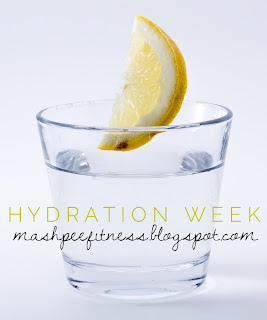Everyone knows that water is important to drink throughout the
day, especially if you are active. Physical activity requires an increased
fluid intake because we sweat- which contains not only water but also salts and
other compounds and helps regulate body temperature. This loss of salts can
lead to an electrolyte imbalance. It is important to replace these
electrolytes, especially after vigorous activity. Electrolytes such as sodium,
potassium, and calcium are essential for the body to function and plain water
typically does not contain these vital electrolytes. Coconut water and sports
drinks are often looked to after physical activity to restore hydration levels
as well as electrolyte levels. But which is better?
day, especially if you are active. Physical activity requires an increased
fluid intake because we sweat- which contains not only water but also salts and
other compounds and helps regulate body temperature. This loss of salts can
lead to an electrolyte imbalance. It is important to replace these
electrolytes, especially after vigorous activity. Electrolytes such as sodium,
potassium, and calcium are essential for the body to function and plain water
typically does not contain these vital electrolytes. Coconut water and sports
drinks are often looked to after physical activity to restore hydration levels
as well as electrolyte levels. But which is better?
Coconut Water
Coconut water is the clear liquid inside young, green coconuts.
Coconut water is different from coconut milk which is squeezed from the white,
freshly outer layer.2 It is packed with naturally occurring
potassium, sodium, calcium, magnesium, and phosphorus- all very important
electrolytes. Coconut water also contains natural sugars and protein.
Coconut water is different from coconut milk which is squeezed from the white,
freshly outer layer.2 It is packed with naturally occurring
potassium, sodium, calcium, magnesium, and phosphorus- all very important
electrolytes. Coconut water also contains natural sugars and protein.
Sports Drinks
Sports drinks are specifically made with added electrolytes,
carbohydrates, or protein, depending on the brand. Many now have a “low
calorie” version, but typically contain calories in the form of carbohydrates
to help restore energy levels during or after physical activity. Sports drinks
sometimes contain protein to help aid muscle recovery, adding to the calorie
count.
carbohydrates, or protein, depending on the brand. Many now have a “low
calorie” version, but typically contain calories in the form of carbohydrates
to help restore energy levels during or after physical activity. Sports drinks
sometimes contain protein to help aid muscle recovery, adding to the calorie
count.
Which is Better?
There are only a few research studies comparing coconut water,
sports drinks, and plain water directly. In regards to rehydrating, Harvard
Medical School recommends drinking plain water if you are not doing vigorous
physical activity. “Drink when you are thirsty and don’t waste your money or
calories on sports drinks- choose water instead… Athletes who have had a muscle cramps may
need to drink extra, and may need more electrolytes.”4 While it is
better to drink either coconut water or a sports drink to replace electrolytes,
the studies that have been done found no significant difference between
rehydrating with either one. Both will replace the electrolytes lost, help
refuel you with energy, and contain protein.1,2,3 However, it was
found that both coconut water and sports drinks will lead to more
gastrointestinal bloating compared to plain water.3 Interestingly,
those participants drinking sports drinks felt that their thirst was quenched
better than those drinking plain water or coconut water.1
sports drinks, and plain water directly. In regards to rehydrating, Harvard
Medical School recommends drinking plain water if you are not doing vigorous
physical activity. “Drink when you are thirsty and don’t waste your money or
calories on sports drinks- choose water instead… Athletes who have had a muscle cramps may
need to drink extra, and may need more electrolytes.”4 While it is
better to drink either coconut water or a sports drink to replace electrolytes,
the studies that have been done found no significant difference between
rehydrating with either one. Both will replace the electrolytes lost, help
refuel you with energy, and contain protein.1,2,3 However, it was
found that both coconut water and sports drinks will lead to more
gastrointestinal bloating compared to plain water.3 Interestingly,
those participants drinking sports drinks felt that their thirst was quenched
better than those drinking plain water or coconut water.1
Overall, all agreed to rehydrate! Save the coconut water and
sports drinks for moderate to vigorous intensity physical activity. Drink plain
water throughout the day. If you are not sure how much water you should be
drinking, check with your doctor.
sports drinks for moderate to vigorous intensity physical activity. Drink plain
water throughout the day. If you are not sure how much water you should be
drinking, check with your doctor.
Reference
- Kalman, D. S., Feldman, S., Krieger, D. R., & Bloomer, R. J.
(2012). Comparison of coconut water and a carbohydrate-electrolyte sport drink
on measures of hydration and physical performance in exercise-trained men. J
Int Soc Sports Nutr Journal of the International Society of Sports Nutrition,
9(1), 1. Retrieved March 9, 2016, from https://jissn.biomedcentral.com/articles/10.1186/1550-2783-9-1 - Levers, K. (n.d.). NATURE’S GATORADE: Effectiveness of Coconut
Water on Electrolyte and Carbohydrate Replacement. Retrieved March 09, 2016,
from https://huffinesinstitute.org/resources/articles/articletype/articleview/articleid/446/natures-gatorade-effectiveness-of-coconut-water-on-electrolyte-and-carbohydrate-replacement - Saat, M., Singh, R., Sirisinghe, R. G., & Nawawi, M. (2002).
Rehydration after Exercise with Fresh Young Coconut Water,
Carbohydrate-Electrolyte Beverage and Plain Water. [Abstract].J. Physiol.
Anthropol. Journal of PHYSIOLOGICAL ANTHROPOLOGY and Applied Human Science,
21(2), 93-104. Retrieved March 9, 2016, from https://www.ncbi.nlm.nih.gov/pubmed/12056182 - Skerrett, P. J. (2012, July 30). Trade sports drinks for water [Web
log post]. Retrieved March 9, 2016, from https://www.health.harvard.edu/blog/trade-sports-drinks-for-water-201207305079
Blog post by Nikki Courtney.


